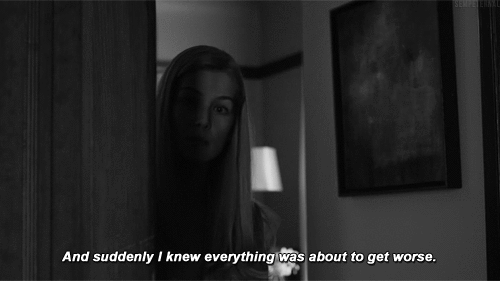Comparisons are
odious as the old
English saying goes. But it’s something people in the
publishing industry are guiltier of than anyone else. Whether it’s
commercial fiction blaring the name of a more popular writer in the
genre: a pink packaged book with “the new Sophie Kinsella!” on it
for example, or a horror book called “just like Stephen King”,
they put things in little boxes making it easier for old readers to
access, but maybe a little off-putting to the person who didn’t
like Kinsella or King to begin with.
Which brings us to
the problem with The Girl On The Train by Paula Hawkins.
Hawkins’ book is an energetic crime thriller, a narrator who isn’t
quite what she seems to be, and that was enough to make her
publishers think, “Hmm, who was popular recently? Oh, yes, Gillian
Flynn!” So inevitably, her book got called “the new Gone Girl”
which led a lot of people who loved the book and/or the movie to pick
it up in great excitement. Which led to the downfall.
I’ve read almost
all of Flynn’s work. I’m a fan. But Hawkins’ first book under
her own name (her fifth in total, the other four were romantic romps
under a pseudonym) is as apart from Gone Girl as say The
Millenium Trilogy is from The Mockingjay Trilogy. In The
Girl On The Train, Rachel, a narrator who you learn in the first
few pages, is commuting to London from her flatshare in the suburbs
every morning at the same time, looks out for a certain house on one
of the train’s usual stops. In this house is a young couple, whose
life seems idyllic to her—they sun themselves, they seem happy,
they laugh, and she makes up names for them and invents a life.
You can tell quite
early on that Rachel isn’t happy with her own life (the reasons,
innumerable, are revealed later) and so the book has a crazy,
vertiginous feel. The reader is in the head of someone not quite
reliable, and as it is with point-of-view narrators, you only are
given the story in the beginning through Rachel’s eyes. When she is
revealed to be not what you thought she was, you feel as betrayed as
she does, and yet Rachel with all her flaws is a more likeable, more
relatable character than Gone Girl’s Amy. You might have
Rachel for a co-passenger, you might even make some chit-chat with
her, but with Amy, you’d probably be a little intimidated by her
beauty and wit.
Of course, you don’t
have to like the main character of a book. The “anti-heroine” is
coming into full force, but while men almost crave the anti-hero
(consider Walter White in the TV show Breaking Bad and how men
across the globe both longed to be him or be around him), women find
it almost personally insulting. Novelist Claire Messud was taken
aback when an interviewer from Publisher’s Weekly asked her why her
main character was so unlikeable in her novel The Woman Upstairs
and said, “For
heaven’s sake, what kind of question is that? Would you want to be
friends with Humbert Humbert? Would you want to be friends with
Mickey Sabbath? Saleem Sinai? Hamlet? Krapp? Oedipus? Oscar Wao?
Antigone? Raskolnikov? Any of the characters in The
Corrections?
Any of the characters in Infinite
Jest?
Any of the characters in anything Pynchon has ever written? Or Martin
Amis? Or Orhan Pamuk? Or Alice Munro, for that matter? If you’re
reading to find friends, you’re in deep trouble. We read to find
life, in all its possibilities. The relevant question isn’t ‘Is
this a potential friend for me?’ but ‘Is this character alive?’
”
Which
leads me to a deeper question: why do we read? Some of us do
read
to find friends, an idea that Messud thinks is ridiculous, but which
is evidenced by how many feel-good pap novels still dominate the
bestseller lists. When it comes to your average mystery reader, you
read to feel engaged, to feel alive, goosebumps rising on your skin,
your heart thumping as you stay awake till way past your bedtime just
to find out who did it. In all this, it’s very comforting to have a
main character who is as troubled by the mystery as you are, but who
also figures it out two steps ahead of you, but sometimes, like in
the case of The
Girl On The Train,
it’s also an interesting feeling to let go and let the novel take
you where it will like an unmanned ship on a stormy sea. I will say
this for both “Girls”, they give the reader the same sense of
having your legs kicked out from under you: you think you know where
you are until you don’t. You think you know this person whose head
you’re inside until… well, until you don’t.
I
do like that The
Girl On The Train
sort of conspires with us readers though. Rachel looking out from her
train window and us, looking out through Rachel. Both of us realising
that our version of the story isn’t the complete truth, but both of
us wanting to believe it anyway.




No comments:
Post a Comment
Thanks for your feedback! It'll be published once I approve it. Inflammatory/abusive comments will not be posted. Please play nice.